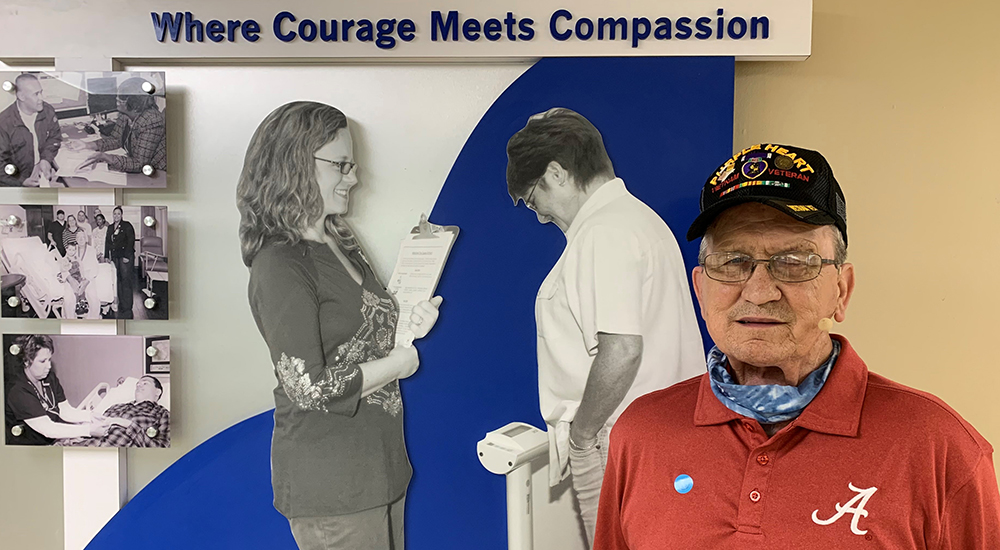Purple Heart recipient David Causey (pictured above) has a lot to say now. Causey is the Birmingham VA’s first recipient of an “artificial larynx” device that substitutes sound and vibration in the absence of a voice box.
“Since Mr. Causey had a laryngectomy (removal of voice box), he was unable to produce voice or sound for speech,” said speech pathologist Travis Wolfe. “He presses a button that activates the “artificial larynx” implanted into the upper denture. It produces sound that is then used to talk.
“It is an alternative to the electrolarynx that you may see held up to a laryngectomee’s neck that makes a vibrating sound. This is the first such device I’m aware of being issued at the Birmingham VA.”
Shrapnel wounded in Vietnam
Causey is a Pell City, Alabama, native. He was drafted in March 1970 and shipped to Vietnam. He later volunteered for the 101st Airborne Recon.
In February of the following year, Causey and another Soldier were walking in the jungle of Vietnam when his life was forever changed. As they were walking point, his battle buddy tripped a mine and was killed instantly.
Causey, who was walking a mere 10 yards behind, was hit with shrapnel. It pierced his abdomen, groin, right shoulder and leg. Causey was airlifted for treatment and later flown to Japan for a month of additional treatment. His stomach later became infected. As a result, he was sent to Illinois for nine months of hospitalization. In November 1971, he was honorably discharged and later awarded the Purple Heart for wounds incurred during combat.
In 2017, Causey began having problems swallowing and it became difficult to eat or drink. He was diagnosed with squamous cell carcinoma of his epiglottis (tissue protecting the windpipe). After seven weeks of radiation treatment, it was believed the cancer was eliminated. But in October 2017, the cancer returned and a total laryngectomy was needed, which included removal of his voice box.
Following various complications and numerous operations, in 2019 Causey’s prosthesis was removed and in September, he found a solution to aide his predicament.
Speaker placed in denture
When he struggled using his electrolarynx speaking device, Causey and his daughter, Lisa Milsap, found out about a new device online. Dr. Jack Morris and his team did the rest. Morris is a prosthodontist at the Birmingham VA.
Causey later discussed his options with Wolfe. Wolfe says: “We made Mr. Causey’s denture first and sent it out to place a speaker in the denture to help the patient with his speech.” Wolfe will help Causey learn to speak with the device.
The built-in speaker creates a natural voice tone that simulates the voice sound that the larynx normally makes. The laryngectomee shapes the voice into speech patterns in the same way Causey would shape the sounds from his own voice box. The loudspeaker has flexible membrane covering the speaker to protect it from saliva, food and liquids. Next, Mr. Causey will have therapy sessions focusing on articulation.
“I am so happy VA allowed me to get this,” said Causey. “I like it a lot better.”
Derrick Smith is a public affairs specialist with the Birmingham VA Health Care System.
Topics in this story
More Stories
Study underscores important role COVID vaccination can have in protecting Veterans from infection and reducing long-term health consequences
Columbia VA’s robotic surgery teams completed their 800th robotic surgery and are on schedule to hit 1,000 by the end of the year.
In a decentralized clinical trial, Veterans can participate from their own homes or local VA instead of having to travel to a research site.








